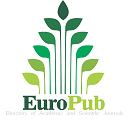Sifat Fisik Daging Domba Garut Jantan dengan Waktu Pemberian Pakan yang Berbeda
Keywords:
ambient temperature, Garut lamb, feeding time, physical meat characteristics
Abstract
High ambient temperature in tropical, especially during the daytime of Garut lamb cause highlevel of stress and low productivity. To overcome it can be improved the management. If the feed is given
in the evening, its metabolism process will take place throughout the night with the lower temperature.
This method is expected result the higher productivity include the meat quality. So the aim of this
study was to evaluate the influence of feeding time (morning and evening) toward the physical meat
characteristics of Garut lamb. 12 Garut lamb were used. They were placed in 12 individual cages. This
study used block randomized design. As treatment was feeding time. As feed was a mix of field grass and
concentrates (40:60). Data of physical meat characteristics were analyzed by t-test. The physical meat
characteristics include value of pH, the ability to water bind, cooking loss, and score of meat colour were
not significant. Garut lamb that was given feed at morning time, significant resulted the meat with more
tender (1.04 kg/cm2) than the feeding time at evening (1.59 kg/cm2) (P<0.05). It can be concluded that
the physical meat characteristics (except meat tenderness) of Garut lamb were similar in both different
feeding time. The treatment of different feeding time can be change the behaviour of Garut lamb.
Downloads
How to Cite
RahayuS., AdityaE. L., & JamilS. (1). Sifat Fisik Daging Domba Garut Jantan dengan Waktu Pemberian Pakan yang Berbeda. Jurnal Ilmu Produksi Dan Teknologi Hasil Peternakan, 3(2), 79-82. Retrieved from https://journal.ipb.ac.id/index.php/ipthp/article/view/12212
Section
Articles















